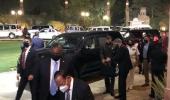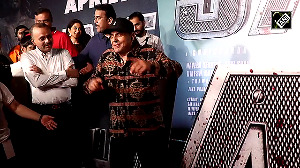'I made it known through diplomatic channels that I was unhappy.'
'So, he called me and tried to explain, but I said this is something that doesn't happen between friends.'

Former United States secretary of state Colin Powell, who was at the centre of action during the American invasion of Iraq after the 9/11 terror attacks, passed away on October 18.
As US secretary of state, Powell is remembered mostly for his address before the United Nations Security Council in 2003, where he made the case for war against Iraq, 'by casting Saddam Hussein as a major global threat who possessed weapons of mass destruction', even displaying a vial of what he said could have been a biological weapon'.
Yashwant Sinha, who served as external affairs minister in the latter half of the Atal Bihari Vajpayee government, "enjoyed a good personal rapport" with Powell during his stint at the MEA.
It was a time when the relations between India and the United States improved remarkably after being strained for a few years post India's nuclear tests in Pokhran in 1998.
In an interview with Rediff.com's Utkarsh Mishra, Sinha recalled instances of his warm and friendly relations with Powell, including the one when the latter apologised to him for making an announcement favourable to Pakistan.
In your autobiography Relentless, you have said that you had developed cordial relations with Colin Powell during your stint as the MEA. Can you tell us more about your relations as friends and as representatives of two big democracies?
My first meeting with Colin Powell was when he visited India some time after I had taken over the external affairs ministry.
Those were the days when India and Pakistan were eyeball to eyeball, all along the international boundary as well as the Line of Control. And the world believed that India and Pakistan were about to go at each other with nuclear weapons.
So, they were very worried. And a number of foreign dignitaries made visits to India to understand what the situation was, and to play their role in this imagined nuclear conflict.
It was in that context that Colin Powell made a visit to India.
I had just taken over as the external affairs minister. But because we were almost of the same age, so right in the beginning of the conversation, Powell struck a personal note and came on first name terms.
I remember telling him that you're all fearing that India and Pakistan will attack each other with nuclear weapons, but nobody has told me where to hide if there was a nuclear attack on Delhi, which was a very easy target.
I said all these (fears) are misplaced. Yes, we are eyeball to eyeball and we have mobilised our troops, but that was because of the terrorism unleashed by Pakistan from across the border. And that is something about which the world community, including you (the US) should bother.
So, we had a pleasant discussion and I made my points. And then we met a number of times, not only in Washington, DC and New Delhi, but elsewhere also. For instance, I remember I was visiting Moscow, and Powell was also visiting Moscow at same time, so we decided to meet in Moscow.
On the margins of all multilateral meetings, we used to have bilateral meetings also. Whenever we went to the United Nations General Assembly, we used to meet. So, it was a good personal relationship.
But I must tell you, he represented the US and I represented India. And superseding the personal relationship or whatever cordiality there was, was the fact that we both wanted to protect the national interest of our respective countries.
That was the uppermost in our mindd.
I remember there was a bit of misunderstanding with Powell (once) when he had visited Delhi and proceeded to Islamabad after the visit, and there he made an announcement that the US will treat Pakistan as an important non-NATO (North Atlantic Treaty Organisation) ally.
I was very unhappy with that because he had not taken me into confidence. And I made it known through diplomatic channels that I was unhappy. So, he called me and tried to explain, but I said this is something that doesn't happen between friends.
I said underlining the relationship was that we do not surprise each other. We'll take each other into confidence, not surprise each other and this is one instance where you have surprised us.
So, I would say that safeguarding of national interests was the uppermost in his mind and the uppermost in my mind. But we enjoyed a good personal rapport.
India-US relations took a new turn for the better after the 9/11 attacks. What role did Powell play in bettering the ties at that time?
He played a very important role. You remember that Mr Vajpayee had said that we (India and the US) were natural partners as two largest democracies.
A strategic depth to the Indo-US relationship was provided during that time; because we did not suffer from the Cold War attitude (of) keeping the US at a distance and depending entirely on Russia.
We maintained a very good relationship with Russia, it was an important partner. But we tried to improve our relationship with the US and we succeeded in doing so.
And the fact that President (Bill) Clinton came here and Mr Vajpayee made official visits to Washington, DC, is an indication of that, coming as it did immediately after the nuclear tests (of 1998) when the US put us in the doghouse.
Powell is often criticised for his speech at the UN Security Council in 2003 to make the case for war against Iraq. You've also recounted in your book, that Prime Minister Vajpayee was not inclined to send Indian troops, not even the medical contingent, to Iraq despite the US wanting him to do so.
How did all that play out? How do you see Powell's role at that time, though he later said that 'he regretted providing misleading intelligence' at that time?
He was clearly wrong. He was misinformed. If the US action in Iraq was based on WMDs (weapons of mass destruction) then it turned out to be a hoax.
So, that speech of Powell in the UN Security Council was completely misplaced and so was their action in Iraq.
That's why, in our Parliament, our government agreed to pass a resolution in which we deplored the US action in Iraq.
Did Powell not say, as you did after his announcement in Pakistan, that India surprised the US by that resolution?
No. We had made it very clear to them before the Parliament resolution that Iraq is a misadventure that they shouldn't have indulged in.
Therefore, I would not say that the Parliament resolution was a surprise for the US.
You also mention that when you spoke to him after the Pakistan announcement, he apologised to you. Did he apologise as a friend or as the representative of the US?
No, there was no personal friendship. I want to make that very clear. When you are in government and representing your country, you may enjoy a cordial relationship or friendly relationship with any foreign dignitary, but as I said, uppermost in your mind is your own national interest.
And I'm saying this especially in the context of today, when foreign policy has been personalised in this regime.
I often say that if Mr (Narendra) Modi had a very good personal relationship with (former US Presidents Donald) Trump or (Barack) Obama, where is that (relationship) today, with somebody else in the White House?
So, in diplomacy, if you have 10 steps to take, personal relationship only takes you half a step forward. I enjoyed very good personal relationship (even) with the foreign minister of Pakistan.
Any particular incident with Powell that you want to recount?
My last visit to the US as the external affairs minister minister was in January of 2004.
I was invited by President (George W) Bush to meet him in his Oval Office. And I've said in a recent piece that I wrote for the Indian Express that to date, I'm the only minister of the Government of India who has met the US president in the Oval Office on a one-on-one basis.
Powell was there, along with a host of American officials, including the then National Security Advisor Condoleezza Rice. Later, I (also) had bilateral meetings with them.
It could not have happened if Powell had not suggested it.
I enjoyed a fairly decent personal relation with President Bush and I remember once I was coming out of the UN building, and Bush was going in. When he looked at me, he stopped and we shook hands and started talking. And he said that 'Colin is very fond of you, thinks highly of you'.
The next time I met Powell, I said, 'Oh, you're a friend! You have been complaining to your president about me?'
He was taken aback. He said, 'Why? What happened? I never did such a thing'.
I told him that this is what happened and I was only joking.
Did you speak to him after leaving office?
Not really. I don't know why it didn't happen. We lost touch.
In any case, I was very sorry to hear that he's no more.











 © 2025
© 2025